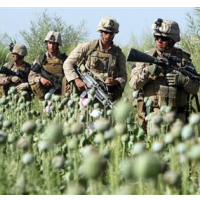U.S. and NATO Killed Drug Dealers in Afghanistan
 U.S. Marines in Afghan poppy fields (photo: David Guttenfelder, AP)
U.S. Marines in Afghan poppy fields (photo: David Guttenfelder, AP)
The military campaign inside Afghanistan has at times extended beyond targeting and attacking insurgents to also include drug dealers suspected of aiding either the Taliban or al Qaeda.
Secret U.S. documents obtained by the German newspaper Der Spiegel–some of which were provided by whistleblower Edward Snowden—revealed U.S. and NATO units operating under the International Security Assistance Force (ISAF) went after individuals involved in Afghanistan’s narcotics trade.
Beginning in 2008, “Narcotics traffickers were added to the Joint Prioritized Effects List (JPEL) list for the first time,” according to a National Security Agency report that was among the documents.
These missions were justified on grounds that the drug dealings were financially supporting militants, even though firsthand evidence supporting this assumption wasn’t available to officials. Instead, according to the NSA document, ISAF operations relied on a United Nations report saying the Taliban collected $300 million annually through drug sales. The document concluded that insurgents “could not be defeated without disrupting the drug trade.”
“The documents show that the deadly missions were not just viewed as a last resort to prevent attacks, but were in fact part of everyday life in the guerilla war in Afghanistan,” stated Der Spiegel. “The list, which included up to 750 people at times, proves for the first time that NATO didn't just target the Taliban leadership, but also eliminated mid- and lower-level members of the group on a large scale. Some Afghans were only on the list because, as drug dealers, they were allegedly supporting the insurgents.”
One of the documents details the method by which targets were detected, based on the monitoring of Taliban mobile phone conversations. “[That] document also reveals how vague the basis for deadly operations apparently was,” said the newspaper.
These revelations show that the “war on terror” became deeply intermingled with the “war on drugs,” according to Reprieve attorney Jennifer Gibson. “This is both new and extremely legally troubling,” she told the publication.
“The kill lists raise legal and moral questions that extend far beyond Afghanistan,” added Der Spiegel. “Can a democracy be allowed to kill its enemies in a targeted manner when the objective is not to prevent an imminent attack?”
-Danny Biederman, Noel Brinkerhoff
To Learn More:
Obama's Lists: A Dubious History of Targeted Killings in Afghanistan (Der Spiegel)
SIGINT Helps Hobble the Taleban by Cutting off Their Livelihood (Der Spiegel)
- Top Stories
- Unusual News
- Where is the Money Going?
- Controversies
- U.S. and the World
- Appointments and Resignations
- Latest News
- Trump to Stop Deportations If…
- Trump Denounces World Series
- What If China Invaded the United States?
- Donald Trump Has a Mental Health Problem and It Has a Name
- Trump Goes on Renaming Frenzy






Comments